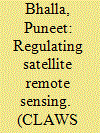| Srl | Item |
| 1 |
ID:
170592


|
|
|
|
|
| Summary/Abstract |
International political outcomes are deeply shaped by the balance of power, but some military capabilities rely on secrecy to be effective. These “clandestine capabilities” pose problems for converting military advantages into political gains. If clandestine capabilities are revealed, adversaries may be able to take steps that attenuate the advantages they are supposed to provide. On the other hand, if these capabilities are not revealed, then adversaries will be unaware of, and unimpressed by, the real balance of power. Most of the existing literature emphasizes that states have few incentives to signal their clandestine capabilities. This conclusion deserves qualification: the condition of long-term peacetime competition can make signaling a profitable decision. Within this context, two important variables help determine whether a state will signal or conceal its secret capabilities: the uniqueness of the capability and the anticipated responsiveness of the adversary. An extended case study of Cold War strategic antisubmarine warfare confirms these predictions.
|
|
|
|
|
|
|
|
|
|
|
|
|
|
|
|
| 2 |
ID:
131028


|
|
|
|
|
| Publication |
2014.
|
| Summary/Abstract |
The freedom of operations in space and of remote sensing by satellites has been globally accepted through different UN Conventions. Satellite imaging provides unrestricted access to areas transcending international borders and its commercialisation has resulted in the irrelevance of these borders even for distribution of data as commercial entities seek a larger and more diversi?ed customer base. Availability of such information commercially is enabling and in?uencing worldwide scienti?c, technological, social and economic advancements. However, its dual use potential that could provide disproportionate strategic and military advantages has raised concerns regarding the distribution. Differing interests have made regulating the sector a complex task. Nations that possess the capability want to strike a balance between their national security interests and foreign policy concerns, on the one hand, and commercial interests, on the other. At the same time, all nations remain apprehensive about the distribution of information about their area without their knowledge or consent.
|
|
|
|
|
|
|
|
|
|
|
|
|
|
|
|